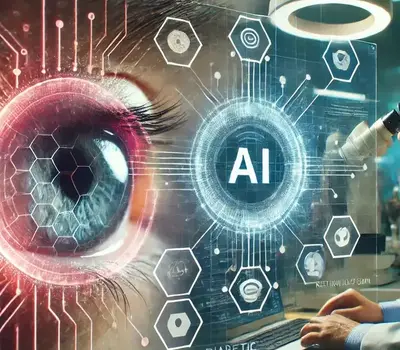Advances in artificial intelligence (AI) are transforming the field of ophthalmology. With AI-driven tools for the early detection of retinal diseases, like diabetic retinopathy and age-related macular degeneration (AMD), a new era is unfolding in eye care. The ability of AI to analyze vast amounts of data quickly and accurately is reshaping how eye diseases are diagnosed, often before patients experience noticeable symptoms. This article explores how AI is revolutionizing early detection in retinal diseases and its potential impact on eye health.

The Growing Challenge of Retinal Diseases
Retinal diseases affect millions of people worldwide, often leading to vision loss if not detected early. Conditions like diabetic retinopathy and AMD are common culprits. According to the World Health Organization, over 196 million people globally suffer from AMD, and 463 million people live with diabetes, making diabetic retinopathy a growing concern.
Case Start: Early Detection in Action
Maria, a 54-year-old school teacher, had no symptoms of vision loss, but routine screening using AI-based technology detected early signs of diabetic retinopathy. Thanks to early intervention, her vision was preserved. Similarly, Peter, a 65-year-old retiree, was screened for AMD using AI algorithms, which identified the disease long before it would have been detected using traditional methods.
How AI Works in Retinal Screening
AI tools use machine learning algorithms to analyze retinal images captured during routine eye exams. These systems can detect minute changes in the retina that may indicate early-stage diseases like AMD or diabetic retinopathy. The technology not only increases diagnostic accuracy but also reduces the burden on ophthalmologists by handling large-scale screenings quickly.
Here’s a table showing how AI compares to traditional retinal screening methods:
| Feature | Traditional Screening | AI-based Screening |
|---|---|---|
| Time Efficiency | Can take weeks for results | Immediate or near-instant results |
| Accuracy | Dependent on human expertise | Consistently high with large datasets |
| Scalability | Limited to the number of specialists | Can screen millions simultaneously |
| Cost-effectiveness | Expensive for large populations | Lower costs for mass screenings |
AI in Diabetic Retinopathy Screening
AI has been particularly effective in diagnosing diabetic retinopathy, a complication of diabetes that affects the retina and can lead to blindness. AI-driven systems, such as those developed by companies like Google’s DeepMind, have demonstrated 94-96% accuracy in detecting diabetic retinopathy at early stages. These systems are capable of analyzing retinal photographs faster and more precisely than traditional screening methods.
“AI-based diabetic retinopathy screening can reduce the workload of ophthalmologists by up to 80%, improving healthcare efficiency.” — American Academy of Ophthalmology
Case: AMD Detection with AI
Susan, a 72-year-old with no family history of eye diseases, visited her ophthalmologist for a routine check-up. A deep-learning AI system flagged early signs of AMD. Thanks to early detection, Susan was able to start treatment before any significant vision loss occurred.
Challenges and Limitations
While AI offers significant advantages, there are challenges to consider. Regulatory hurdles and concerns about data privacy are ongoing issues. Additionally, integrating AI into existing healthcare systems requires substantial investment in infrastructure.
“Ensuring patient data privacy and meeting regulatory standards are critical steps in the widespread adoption of AI in ophthalmology.” — Ophthalmology Times
The Future of AI in Ophthalmology
The future of AI in ophthalmology looks promising. As algorithms improve and become more accessible, we can expect AI tools to be integrated into routine eye care globally. This will not only enhance early detection but also improve outcomes for millions of patients.
“AI in ophthalmology is no longer a futuristic concept—it’s an essential tool that will shape the future of eye care.” — The Lancet Digital Health
A New Era for Ophthalmology
AI has the potential to transform the early detection of retinal diseases, offering a more efficient, accurate, and accessible method of diagnosing conditions like diabetic retinopathy and AMD. As technology continues to evolve, AI will become an integral part of preventing vision loss and improving patient outcomes in the field of ophthalmology.



